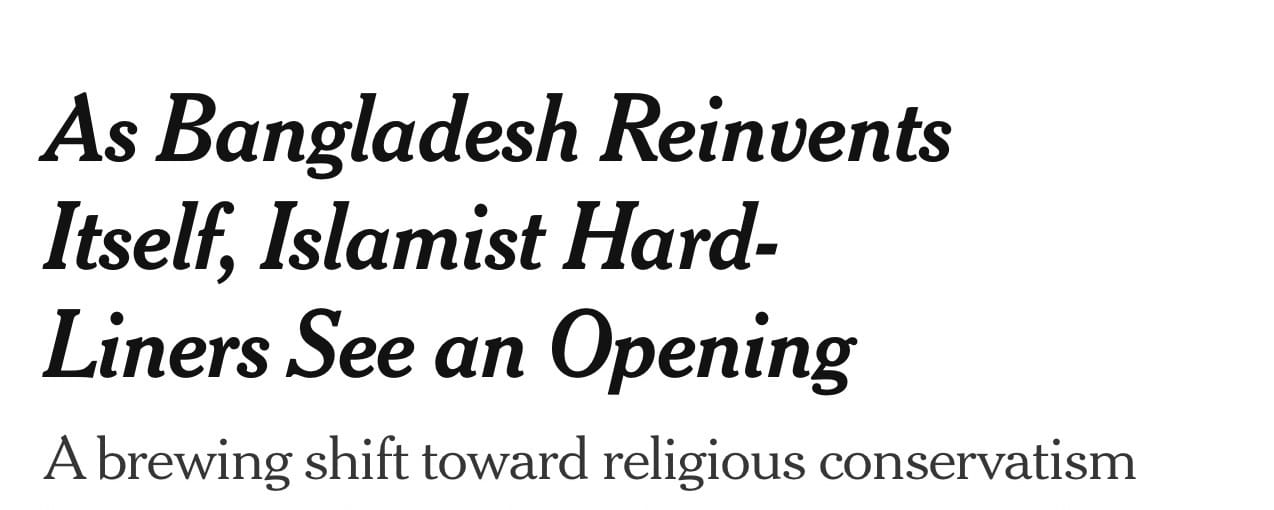Sheikh Hasina's Rule: Authoritarian or Strong Leadership to Ensure Secularism?
Amidst a flurry of propaganda against Sheikh Hasina's leadership, including in the NY Times story "As Bangladesh Reinvents Itself, Islamist Hard-Liners See an Opening," some crucial details were overlooked and, to some degree, misunderstood on the true nature of her leadership.

The piece is actually just an introduction to the grim reality of the rising radicalism and extremism under Md. Yunus’s illegitimate and unconstitutional regime but conveniently ignores how Sheikh Hasina’s leadership safeguarded Bangladesh’s stability, economy & secular fabric. Let's break it down:
1. Strong Leadership, Not Authoritarianism: Sheikh Hasina’s governance was marked by stability and unparalleled economic growth in a historically volatile political landscape. Her firm policies were necessary to maintain law and order, fostering an economic transformation that was unprecedented in the last decade and a half, not just for Bangladesh but on a global scale. In a country with a history of military interventions and political turmoil, her leadership ensured continuity and prosperity.
2. Countering Radicalization, Not Appeasement: Claims that Hasina “appeased” Islamists by allowing unregulated seminaries and funding mosques overlook the strategic rationale behind these moves. She sought to mainstream madrasa education, integrating it with national curricula to curb radicalization. Her nationwide mosque-building project was not an endorsement of political Islam but a calculated effort as a means of soft power to counter extremist narratives by promoting a moderate, religious version of Islam.
3. Suppressing, Not Enabling Extremism: The suggestion that Hasina’s departure created space for extremists ignores the fact that she was Bangladesh’s strongest bulwark against Islamist militancy. She brought to justice the war criminals of the 1971 War of Liberation linked to Jamaat-e-Islami, dismantled terrorist networks like Jama’atul Mujahideen Bangladesh (JMB), and cracked down on Hefazat-e-Islam when it pushed for regressive demands such as curbing the equal rights of women and undermining democracy. With her exit, extremist forces have been emboldened—proving that her leadership was essential in keeping them at bay. The extremist elements now feel that they have found their true leader in Muhammad Yunus as an extremist enabler who can whitewash them before the international community.
4. Security Measures Were Essential: Hasina’s strict security policies successfully prevented large-scale terrorist attacks, a stark contrast to the early 2000s, when Bangladesh suffered waves of Islamist bombings. Even after the 2016 Holey Artisan terror attack, her government decisively neutralized terrorist elements. The recent power shift was not a democratic transition but a calculated assault by Islamist extremists, who saw her removal as a "jihad." The orchestrated July protests, which masked attacks on police stations and KPIs, were a premeditated attempt to dismantle state machinery. The so-called student protest was just an effective mask for the terrorist attack. The warm reception of Muhammad Yunus by these extremist factions further exposes their real motives, as they now rally around him as their leader.
5. Protecting Religious Minorities: Under Sheikh Hasina’s leadership, the government took firm action against communal violence, unlike past administrations that either ignored or abetted attacks on religious minorities. Her absence has left these communities more vulnerable, as evidenced by the rise in targeted violence since her departure.
6. Marginalizing Jamaat-e-Islami: Sheikh Hasina brought to justice the war criminals of the 1971 War of Liberation linked to Jamaat-e-Islami. She effectively sidelined Jamaat-e-Islami by banning the party from elections and cracking down on its extremist wings. The party’s renewed activities following her exit illustrate how her administration was instrumental in keeping Islamist forces in check.
7. Championing Women’s Rights: Sheikh Hasina spearheaded policies that empowered women, significantly increasing their participation in the workforce and expanding access to education. The recent opposition to women’s sports is a direct consequence of her absence, demonstrating how her leadership was vital in safeguarding gender equality.
Sheikh Hasina’s rule was not about authoritarianism or Islamist appeasement—it was about securing Bangladesh’s progress as a secular, democratic nation. She systematically dismantled extremist networks while fostering economic and social development. The instability following her departure underscores just how crucial her leadership was in maintaining national stability and security.

Reply